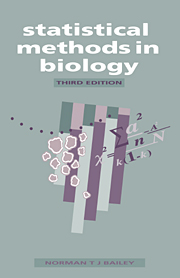Book contents
- Frontmatter
- Contents
- Preface
- 1 Introduction
- 2 Variability and frequency distributions
- 3 Estimation, standard errors and confidence limits
- 4 The basic idea of a significance test
- 5 Simple significance tests based on the normal distribution
- 6 The use of t-tests for small samples
- 7 Contingency tables and χ2
- 8 χ2-tests of goodness-of-fit and homogeneity
- 9 The correlation of measurements
- 10 Regression analysis
- 11 Simple experimental design and the analysis of variance
- 12 Introduction to factorial experiments
- 13 Random samples and random numbers
- 14 Partial correlation and multiple regression
- 15 Non-parametric and distribution-free tests
- 16 Notes on numerical calculation, calculators and computers
- Suggestions for more advanced reading
- Summary of statistical formulae
- Appendix tables
- Index
12 - Introduction to factorial experiments
Published online by Cambridge University Press: 05 June 2012
- Frontmatter
- Contents
- Preface
- 1 Introduction
- 2 Variability and frequency distributions
- 3 Estimation, standard errors and confidence limits
- 4 The basic idea of a significance test
- 5 Simple significance tests based on the normal distribution
- 6 The use of t-tests for small samples
- 7 Contingency tables and χ2
- 8 χ2-tests of goodness-of-fit and homogeneity
- 9 The correlation of measurements
- 10 Regression analysis
- 11 Simple experimental design and the analysis of variance
- 12 Introduction to factorial experiments
- 13 Random samples and random numbers
- 14 Partial correlation and multiple regression
- 15 Non-parametric and distribution-free tests
- 16 Notes on numerical calculation, calculators and computers
- Suggestions for more advanced reading
- Summary of statistical formulae
- Appendix tables
- Index
Summary
THE FACTORIAL PRINCIPLE
In the experimental lay-outs, such as the completely randomised and randomised block designs of Chapter 11, the main object is to compare and estimate the effect of a single set of ‘treatments’ such as different varieties of wheat. The chief purpose of introducing blocks is to make allowance for unwanted but unavoidable heterogeneity. However, as pointed out in section 11.5, we can in some cases use a randomised-block type of analysis for an experiment in which the blocks merely represent the levels of a second factor, such as different types of fertiliser. This raises the whole question of how many factors can be incorporated in a single experimental design, and whether this is or is not a desirable practice.
It is customary in the classical type of scientific experimentation to advocate the investigation of any problem by holding most of the variable factors constant and allowing only one or two to vary in each experiment. If one is largely occupied with fundamental research, where the point is to formulate general laws and test crucial predictions, this procedure of isolating one or two factors at a time has much to recommend it.
If, on the other hand, one is dealing with work that is of a more general nature, such as the prosecution of a plant-breeding programme, then one is essentially concerned to know what happens with a range of combinations of factors.
Information
- Type
- Chapter
- Information
- Statistical Methods in Biology , pp. 134 - 145Publisher: Cambridge University PressPrint publication year: 1995
Accessibility standard: Unknown
Why this information is here
This section outlines the accessibility features of this content - including support for screen readers, full keyboard navigation and high-contrast display options. This may not be relevant for you.Accessibility Information
- 1
- Cited by
